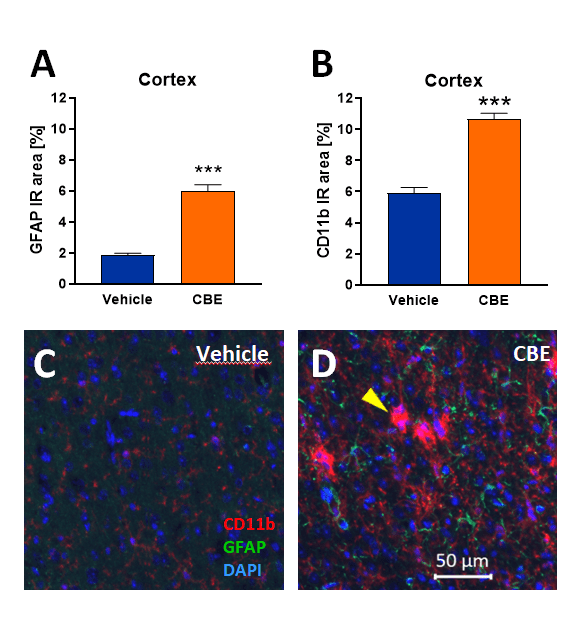Conduritol-β-Epoxide (CBE)-Induced Gaucher Disease
Gaucher disease is the most common lysosomal storage disorder. The main pathological hallmark is the intracellular accumulation of glucosylceramide and glucosphingosine resulting from a reduced glucocerebrosidase (GCase) enzyme activity due to mutations in the β-glucocerebrosidase gene (GBA).
Conduritol-β-epoxide (CBE) is a specific inhibitor of GCase activity and can thus be used to induce Gaucher disease in vivo.
The most important characteristics of CBE-induced mice are:
- Astrocytosis
- Activated microglia
C57Bl/6 mice are intraperitoneally injected with CBE on 9 consecutive days and brains afterwards analyzed for neuroinflammation. Histological evaluation of astrocytosis and microgliosis by immunofluorescent labeling followed by rater-independent signal quantification shows a highly increased immunoreactive area of the GFAP signal (Figure 1A) as well as a highly increased immunoreactive area of the CD11b signal (Figure 1B), indicating strong astrocytosis and activated microglia, respectively.

Figure 1. Cortical astrocytosis and activated microglia of CBE-treated mice. GFAP (A) and CD11b (B) immunoreactive (IR) area in percent. n = 9 per group; unpaired t-test; mean + SEM. ***p<0.001. Representative images of cortical tissue of CBE-treated or vehicle-treated mice. Note the occurrence of extremely enlarged microglia (arrowhead) and increased GFAP signal in CBE-treated mice.
QPS Neuropharmacology offers a custom-tailored study design for the CBE-induced Gaucher disease mouse model, and we are flexible to accommodate to your special interest. We are also happy to advise you and propose study designs. The CBE-induced mouse model shows a relevant Gaucher disease phenotype shortly after treatment. This grants a remarkable fast processing time of your Gaucher disease study. Furthermore, vehicle-injected wild type mice can serve as control needed for proper study design.
We are happy to evaluate the efficacy of your compound in the CBE-induced Gaucher disease mouse model! The most common readout is:
